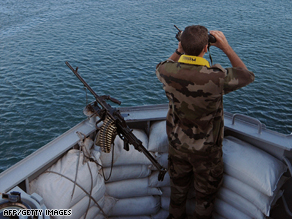Somalia's prime minister told CNN Thursday that the international naval patrols in the Gulf of Aden are not solving the problem of piracy in the region.

Somalia's prime minister says the international naval patrols are having little effect on the piracy problem.
Prime Minister Omar Abdirashid Ali Sharmarke pointed to the recent increase in pirate attacks as evidence, and called for the U.N. arms embargo on Somalia to be lifted so the government can fight back against the pirates and local militant Islamist groups.
"One of our biggest problems is that al-Shabaab has AK-47s, and the pirates have AK-47s, and the government has AK-47s," the prime minister told CNN's David McKenzie in Nairobi, Kenya.
"You can't expect the government to win against such a problem. The only way is to have sufficient capability, and it starts with lifting the arms embargo. You know, we have been handicapped by those sanctions." ![]() Watch more from Somalia's PM »
Watch more from Somalia's PM »
The arms embargo on Somalia has been in effect for more than 16 years. Most serviceable weapons and almost all ammunition currently available in the country have been delivered since 1992, in violation of the embargo, according to the U.N. Security Council.


 by
by  He is not willing to take the political heat in this case because there is language criticizing Israel and the West in the final document. As the world celebrates the election of the first Black President, the United States boycotts the world conference against racism. Symbolism, it seems has met political reality.
He is not willing to take the political heat in this case because there is language criticizing Israel and the West in the final document. As the world celebrates the election of the first Black President, the United States boycotts the world conference against racism. Symbolism, it seems has met political reality. 


